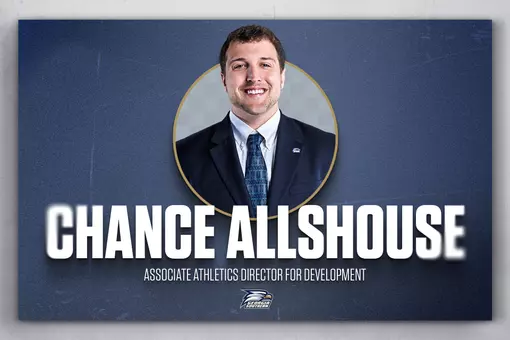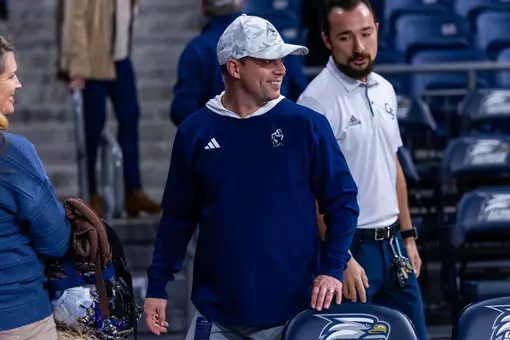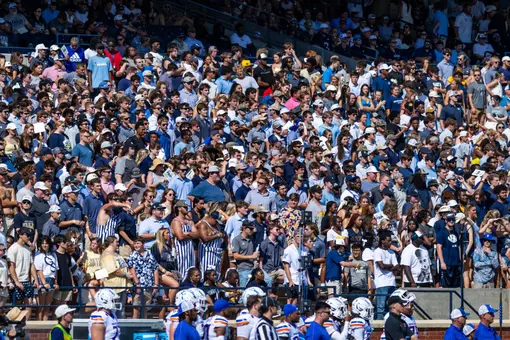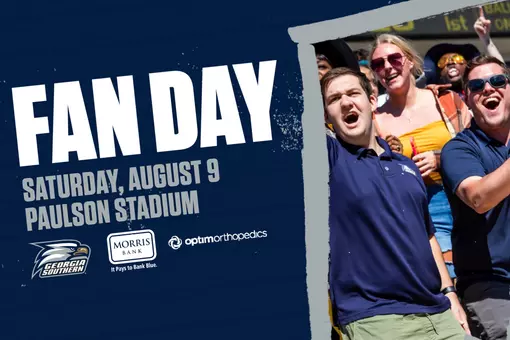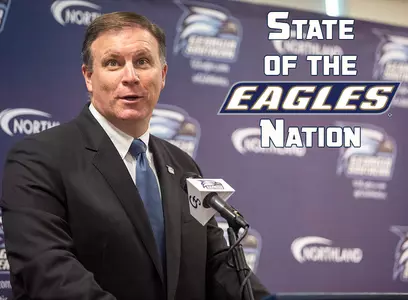
Kleinlein Excited About Direction of GS Athletics
6/7/2017 1:42:00 PM | General
The first in a five-part Q&A session with Georgia Southern AD Tom Kleinlein
With all of Georgia Southern's sports having completed competition for the 2016-17 academic year, Georgia Southern Director of Athletics Tom Kleinlein took some time to answer questions about the past year and wide array of topics that pertain to the immediate and long-term future of GS athletics. Here is the first in a five-part series with the head man of the Eagles.
Q: So we'll start off by asking what were the hot topics discussed at the Sun Belt meetings last month? What can you tell us?
TK: It was announced recently, but the splitting of divisions in football was a big topic of conversation. We have begun our discussions in regards to a championship game for football and how that will come about. Basketball scheduling is always a challenge and I expect an announcement soon in regards to how the conference schedule works out. As we start to get more legislation from the NCAA about student-athlete welfare, we realize that our current model was a challenge for some of our coaches and that we needed to make some changes. We also talked about revenue and where we are as a conference. The great thing about it is that we have improved our position significantly amongst the Group of 5 schools from the time Georgia Southern came aboard to now. I feel really good about where we are as a conference, along with our strengths and positioning right now.
Q: There has been a lot of talk about ESPN's struggles. What can you tell us about how the Sun Belt is positioning itself with all of the technology out there now?
TK: When you look at the Sun Belt, there are five schools that do ESPN3 broadcasts on their campus outside of just football games, and we're one of them. The numbers were presented to us at the conference meetings and the sheer number of eyeballs that are watching the content from the Sun Belt, specifically Georgia Southern, are really impressive. Us, Troy, Appalachian State, Arkansas State and Georgia State are ahead of the curve in this regard. That's the direction that this is headed in with a streaming model. As we enter the negotiations with ESPN, we as a conference, need to think differently about how we distribute our content with the additions of Facebook, Twitter, Amazon. We have to figure out how we do things differently and I think we're in a very good position with the infrastructure we have in place with our streaming capabilities to do that right now. Several others in our conference are looking at doing it how we are and I think that's how we have to start looking to do things. The traditional model of ESPN buying and paying for your rights are going away and now we're looking at selling advertising for streaming broadcasts with a percentage of those sales going back to the conference and a percentage going to the school.
Q: How important is ESPN's revenue stream to Georgia Southern's budget?
TK: Every revenue stream is important, no matter the amount. We're trying to continue to do things to enhance our student-athlete experience and provide our resources so that our young people can graduate, win championships and have great experience here. At the end of the day, whatever our TV contract is, if there's a dollar sign associated with it, it's helping our bottom line. There are some schools and conferences out there who have these contracts that are so enormous that they've built facilities with that money and tied salaries to that number. We haven't done that. It's important to our bottom line, but we haven't based our entire revenue structure around that number.
Q: What can you tell us about future football scheduling?
TK: We continue to fight the challenge of who wants to play us and what's best for our program moving forward. At the end of the day, I don't think people realize that if we can position ourselves as a conference in the top three of the Group of 5, it's significant revenue to our institutions. The difference between fifth place and third place is for $400-500,000 per school. How do we do that? The easiest way to that is to go play schools from those other schools in the Group of 5, and to beat them. As we beat those teams, our position in the Group of 5 moves up. That's one of the things we think about when we schedule. A lot of people ask why we schedule those games. We schedule those games because it gives us the quickest opportunity to improve our ranking in the Group of 5.
Q: It seems Power 5 schools are paying out more and more for non-conference games. Does it make sense to wait and not sign a deal for say 2025 and lock in your payout when you could get more closer to the game, or do you put yourself in a position where there are no games to be had?
TK: That's the poker game that AD's play a lot. I think a lot of the Power 5 schools are starting to realize our level of football is getting a lot better and the days of paying a Sun Belt school, them bringing some fans and the home team picking up a guaranteed win is not necessarily the case anymore. From our position, I try to get games scheduled as quickly as possible. I think that helps me from a budgetary standpoint. I have an idea of what the market is now and what the market is going to be in the coming years. Sometimes that may cost our institution $100,000 or $200,000 because if you wait, you may get $1.7 million instead of $1.5 million, but at the end of the day, to have the security to budget those numbers years out is more beneficial. You also have less risk than waiting to the end and getting caught without any money game at all.
Part 2: Wednesday, June 14
Part 3: Wednesday, June 21
Part 4: Wednesday, June 28
Part 5: Wednesday, July 5
Q: So we'll start off by asking what were the hot topics discussed at the Sun Belt meetings last month? What can you tell us?
TK: It was announced recently, but the splitting of divisions in football was a big topic of conversation. We have begun our discussions in regards to a championship game for football and how that will come about. Basketball scheduling is always a challenge and I expect an announcement soon in regards to how the conference schedule works out. As we start to get more legislation from the NCAA about student-athlete welfare, we realize that our current model was a challenge for some of our coaches and that we needed to make some changes. We also talked about revenue and where we are as a conference. The great thing about it is that we have improved our position significantly amongst the Group of 5 schools from the time Georgia Southern came aboard to now. I feel really good about where we are as a conference, along with our strengths and positioning right now.
Q: There has been a lot of talk about ESPN's struggles. What can you tell us about how the Sun Belt is positioning itself with all of the technology out there now?
TK: When you look at the Sun Belt, there are five schools that do ESPN3 broadcasts on their campus outside of just football games, and we're one of them. The numbers were presented to us at the conference meetings and the sheer number of eyeballs that are watching the content from the Sun Belt, specifically Georgia Southern, are really impressive. Us, Troy, Appalachian State, Arkansas State and Georgia State are ahead of the curve in this regard. That's the direction that this is headed in with a streaming model. As we enter the negotiations with ESPN, we as a conference, need to think differently about how we distribute our content with the additions of Facebook, Twitter, Amazon. We have to figure out how we do things differently and I think we're in a very good position with the infrastructure we have in place with our streaming capabilities to do that right now. Several others in our conference are looking at doing it how we are and I think that's how we have to start looking to do things. The traditional model of ESPN buying and paying for your rights are going away and now we're looking at selling advertising for streaming broadcasts with a percentage of those sales going back to the conference and a percentage going to the school.
Q: How important is ESPN's revenue stream to Georgia Southern's budget?
TK: Every revenue stream is important, no matter the amount. We're trying to continue to do things to enhance our student-athlete experience and provide our resources so that our young people can graduate, win championships and have great experience here. At the end of the day, whatever our TV contract is, if there's a dollar sign associated with it, it's helping our bottom line. There are some schools and conferences out there who have these contracts that are so enormous that they've built facilities with that money and tied salaries to that number. We haven't done that. It's important to our bottom line, but we haven't based our entire revenue structure around that number.
Q: What can you tell us about future football scheduling?
TK: We continue to fight the challenge of who wants to play us and what's best for our program moving forward. At the end of the day, I don't think people realize that if we can position ourselves as a conference in the top three of the Group of 5, it's significant revenue to our institutions. The difference between fifth place and third place is for $400-500,000 per school. How do we do that? The easiest way to that is to go play schools from those other schools in the Group of 5, and to beat them. As we beat those teams, our position in the Group of 5 moves up. That's one of the things we think about when we schedule. A lot of people ask why we schedule those games. We schedule those games because it gives us the quickest opportunity to improve our ranking in the Group of 5.
Q: It seems Power 5 schools are paying out more and more for non-conference games. Does it make sense to wait and not sign a deal for say 2025 and lock in your payout when you could get more closer to the game, or do you put yourself in a position where there are no games to be had?
TK: That's the poker game that AD's play a lot. I think a lot of the Power 5 schools are starting to realize our level of football is getting a lot better and the days of paying a Sun Belt school, them bringing some fans and the home team picking up a guaranteed win is not necessarily the case anymore. From our position, I try to get games scheduled as quickly as possible. I think that helps me from a budgetary standpoint. I have an idea of what the market is now and what the market is going to be in the coming years. Sometimes that may cost our institution $100,000 or $200,000 because if you wait, you may get $1.7 million instead of $1.5 million, but at the end of the day, to have the security to budget those numbers years out is more beneficial. You also have less risk than waiting to the end and getting caught without any money game at all.
Part 2: Wednesday, June 14
Part 3: Wednesday, June 21
Part 4: Wednesday, June 28
Part 5: Wednesday, July 5
Georgia Southern vs. Appalachian State Highlights: JLab Birmingham Bowl (12/29/25)
Tuesday, December 30
Georgia Southern Football Media Availability (12/29/25)
Tuesday, December 30
Georgia Southern Football Media Availability (12/28/25)
Sunday, December 28
Georgia Southern Football Media Availability (12/15/25)
Monday, December 15
